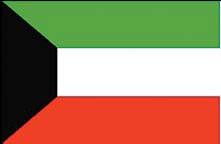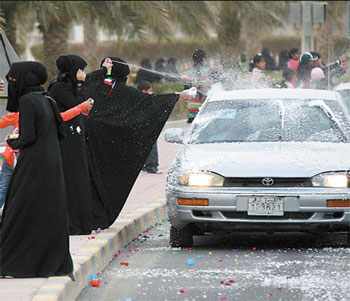Wedged among the Middle Eastern powerhouses of Saudi Arabia, Iran and Iraq on the northwestern tip of the Persian Gulf is Kuwait - one of the world's smallest countries and one of its biggest oil giants.
Beneath the scorched desert sand that covers most of Kuwait's remarkably flat surface is an estimated 94 billion barrels of crude oil, or nearly 10 percent of the world's known supply.
 The discovery of these massive reserves shortly after World War I skyrocketed Kuwait's economy, increasing per capita incomes to among the world's highest and modernizing the country at a pace tradition could barely keep up with.
The discovery of these massive reserves shortly after World War I skyrocketed Kuwait's economy, increasing per capita incomes to among the world's highest and modernizing the country at a pace tradition could barely keep up with.
Today, the country maintains a delicate balance between the old and the new.
Structures in the capital, Kuwait City, such as the Kuwait Towers seem to scream modernity. From the 120th floor of these colossal towers, one can catch a bird's-eye panorama of the city as it abuts the Persian Gulf.
But beneath Kuwait's mantle of modernity is a core of traditionalism, which faces many assaults.
Its key position on the Persian Gulf has meant a steady traffic of foreign trade, and the local culture has been influenced by this exposure.
The local cooking style, for example, borrows from Persian, Indian, Mediterranean and Bedouin cuisines.
One defining characteristic of Kuwaiti food preparation is the steaming of rice, meats and vegetables in a metal pot for several hours. A signature flavoring of the country's dishes is of baharat - a spice mix that combines cardamom, cinnamon, cloves, coriander, cumin, ginger, nutmeg, black pepper and paprika.
Less than half of Kuwait's population are native Kuwaitis, and the people's affinity for music and performing arts has played a crucial role in preserving the native culture.
One particularly popular form of traditional art is the ardah, a folk dance performed by sword-wielding men, while poetry is sung over drumbeats.

Kuwaiti women spray foam on passing cars during continuing celebra-tions of the Gulf emirate's National Day and Liberation Day. AFP
Iraq's 1990 invasion of the country dealt a harsh blow to the country's native culture. Vast archives of music and dance, along with much of the capital city, were destroyed.
Kuwait and UN allies quickly quelled the invasion. Today, the country's government uses the attack as a rallying point for its people.
Every year, the citizens celebrate the victory during Liberation Day on Feb 26. They spend time with loved ones and mourn those who died in combat.
A more recent victory was achieved by Kuwaiti women in 2005, when parliament gave them the right to vote and run for office. The decision marked the end of years of women's rights struggles and further demonstrates Kuwait's great strides toward modernization.
Women's rights have remained one of the most controversial issues in the country, and a milestone for the movement was achieved last year, when Nouria Sbeih was elected to parliament as minister of education.
(China Daily February 29, 2008)